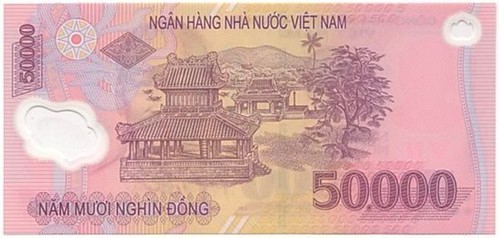
PREV ARTICLE
NEXT ARTICLE
FULL ISSUE
PREV FULL ISSUE
PLACES ON VIETNAM'S BANKNOTESHere's an article from Vietnam about that country's banknotes and the historic places pictured on them. I passed it on to
Howard Daniel, and he says it looks accurate. -Editor
When it comes to the custom of li xi – giving lucky money – during the Tet holiday, Vietnamese always try to put into those symbolic red envelopes the crispest, newest bills they can find. This explains the presence of so many brand-new polymer banknotes before and during the New Year holiday. If you happen to have one of those bills, take a closer look at it now.  VND20,000-bill The blue bill features the 400-year-old Chua Cau (Pagoda Bridge), a popular destination in the ancient town of Hoi An. The bridge, 18 meters long, was built by Japanese traders who once made up a large part of the town’s population and is better known as the Japanese Bridge. It is also a pagoda that was meant for subduing a dragon monster whose head was in India and tail in Japan. Legend has it that when mamazu, as the creature was known, wiggled its tail, earthquakes would happen. Chua Cau is famous for carrying a mixture of Vietnamese, Japanese, and Chinese architecture styles.  VND50,000-bill Phu Van Lau, a historic pavilion in the central city of Hue, and the neighboring communal house Nghenh Luong Dinh have been featured on the VND50,000-bill since 2003 The complex was built some 200 years ago with the pavilion used as a venue to post up Nguyen kings’ edicts, while the house as a royal camping site. Both the sites are part of the Hue Imperial Citadel, a UNESCO world heritage.  VND100,000-bill Here's the image of a thousand-year-old Confucius complex in Hanoi and consists of Van Mieu, or the Temple of Literature, and Quoc Tu Giam – Vietnam’s first national university. One of the capital city’s most popular destinations, the complex attracts millions of visitors and hosts a variety of cultural events every year.  VND200,000-bill As one of the country’s most famous destinations, Ha Long Bay has twice been featured on Vietnamese banknotes – the former VND10,000 paper note and the current VND200,000 polymer note. Against the red background of the bill is a limestone that looks like a giant incense burner. In fact, the iconic stone is locally known as Dinh Huong.  VND500,000-bill The banknote with the highest denomination features a five-room thatch roof that is part of Kim Lien, a museum dedicated to President Ho Chi Minh (1890-1969) in the central province of Nghe An. Located in Sen Village, the museum displays items related to him and his family. Smaller bills feature modern sites like Hai Phong Port on the VND500 or a textile factory in the northern province of Nam Dinh on the VND2,000 bill. Tri An Hydropower Plant in the southern province of Dong Nai graces the VND5,000 note. The VND10,000 has the Bach Ho Oil Field, about 145 kilometers off the southern beach town of Vung Tau. To read the complete article, see: Wayne Homren, Editor The Numismatic Bibliomania Society is a non-profit organization promoting numismatic literature. See our web site at coinbooks.org. To submit items for publication in The E-Sylum, write to the Editor at this address: whomren@gmail.com To subscribe go to: https://my.binhost.com/lists/listinfo/esylum All Rights Reserved. NBS Home Page Contact the NBS webmaster 
|